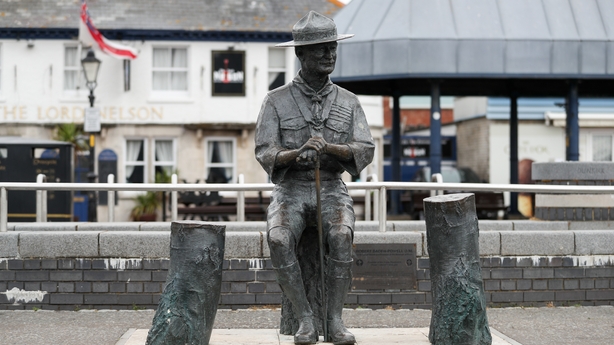The statue of slave trader Edward Colston that was toppled during an anti-racism demonstration in Bristol has been lifted out of the city's harbour after being rolled into the water by protesters.
Bristol City Council posted a video clip on Twitter of the statue being fished out of the water this morning.
It tweeted: "Early this morning we retrieved the statue of Colston from Bristol Harbour."
The council said the statue "is being taken to a secure location" before later forming part of its museum collection.
Early this morning we retrieved the statue of Colston from Bristol Harbour. It is being taken to a secure location before later forming part of our museums collection. pic.twitter.com/moRG8AnNYa
— Bristol City Council (@BristolCouncil) June 11, 2020
Bristol's mayor Marvin Rees had previously confirmed the statue would be exhibited in a museum, alongside placards from the Black Lives Matter protest.
A decision on how the statue's empty plinth will be used will be decided through democratic consultation, he said.
As we run a working harbour, the statue needed to be removed. Thank you to @HarbMasterBris and @bristolmuseum and the salvage crew for assisting us. pic.twitter.com/zbENWkSwkv
— Bristol City Council (@BristolCouncil) June 11, 2020
The statue was pulled down on Sunday amid worldwide protests triggered by the death of George Floyd.
Mr Floyd died after a white police officer held him down by pressing his knee into his neck for almost nine minutes in Minneapolis on 25 May.
The statue's retrieval comes after a senior Labour MP said its forced removal was the result of years of frustration with the democratic process.
Speaking on ITV's Peston yesterday, shadow foreign secretary Lisa Nandy said people decided to take action over the memorial because they felt their voices on racial issues were not being heard.
She said: "Why was that statue removed in the way that it was removed?
"Because for 20 years, protesters and campaigners had used every democratic lever at their disposal, petitions, meetings, protests, trying to get elected politicians to act, and they couldn't reach a consensus and they couldn't get anything done.
"Now this is reflective of what has happened to people of colour in this country and across the world for a very long time. We've had seven reviews into racial discrimination in this country in the last three years alone, and very few of those recommendations have been acted on.
"That is why people are so frustrated, and that's the question we should be asking ourselves, is why is it so difficult for so many people to actually be heard and to pull the democratic leaders to get the democratic change that they need?"
Read - Symbolic destruction: Bringing down the statues
Meanwhile, a local authority in southern England said it would remove a statue of Robert Baden-Powell, founder of the worldwide scouting movement, the latest memorial to be taken down in the wake of anti-racism protests.
The demonstrations have reignited a debate about monuments to those involved in Britain's imperialist past.
Poole council said today that the statue of Baden-Powell, a British Boer War hero, would now be moved from its location on the quayside of the seaside town where it has been for just over a decade to safe storage while there were discussions with local communities about its future.

"Whilst famed for the creation of the Scouts, we also recognise that there are some aspects of Robert Baden-Powell's life that are considered less worthy of commemoration," council leader Vikki Slade said.
His statue currently looks across the harbour to Brownsea Island where he started the scout movement in 1907.
While Baden-Powell, who in 2007 was voted the 13th most influential person in the United Kingdom in the 20th century, was hailed as far-sighted for setting up the scouts, critics said he held racist views and was a supporter of Adolf Hitler and fascism.
Other memorials have also been removed and councils run by the opposition Labour Party said they would review the "appropriateness of local monuments and statues" on public land.
Poole Council said it had taken action to "minimise the risk of any public order" with other effigies, such as a statue of World War II leader Winston Churchill opposite parliament, becoming targets during protests.

